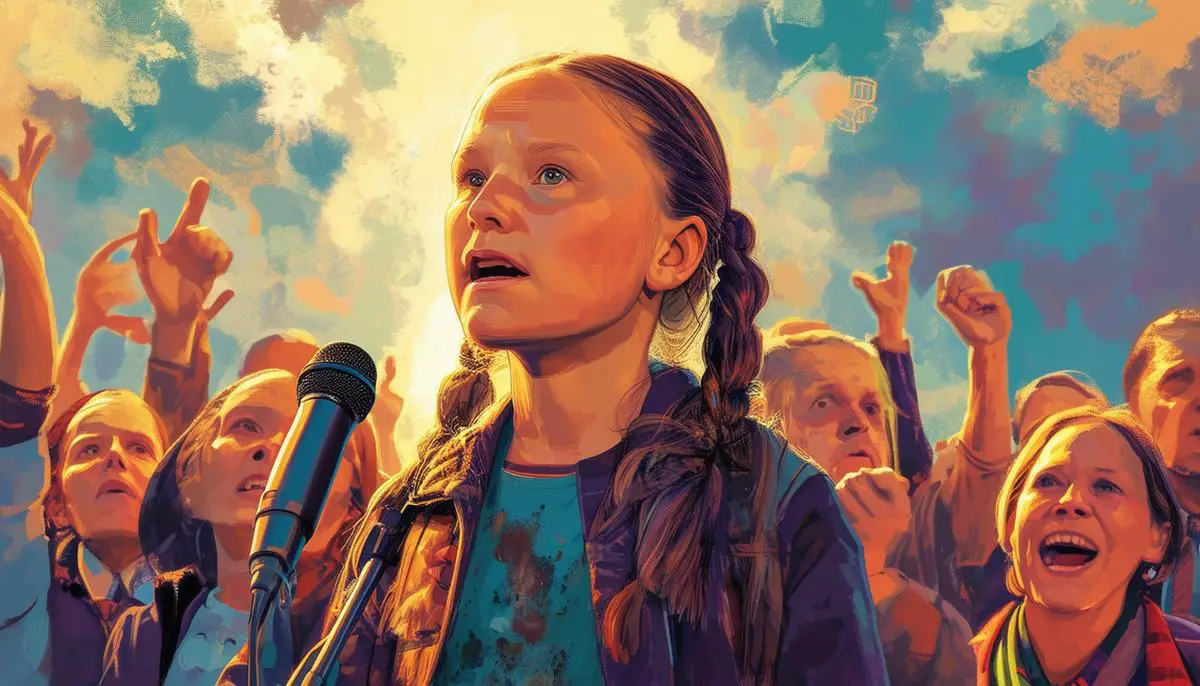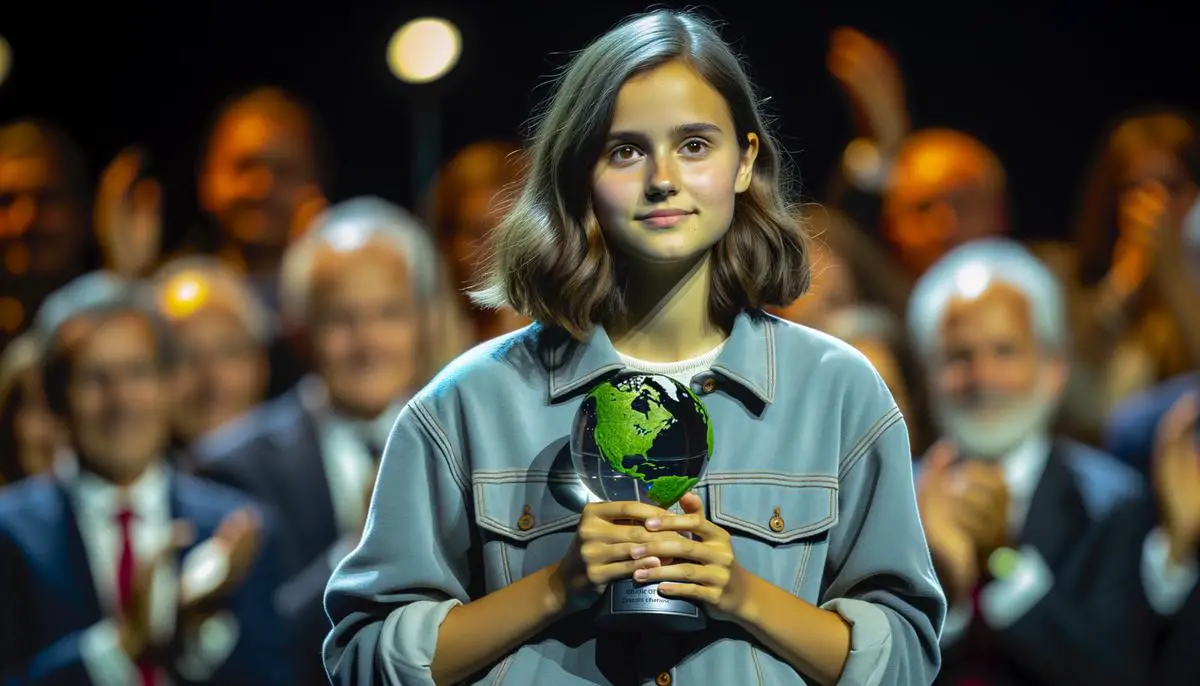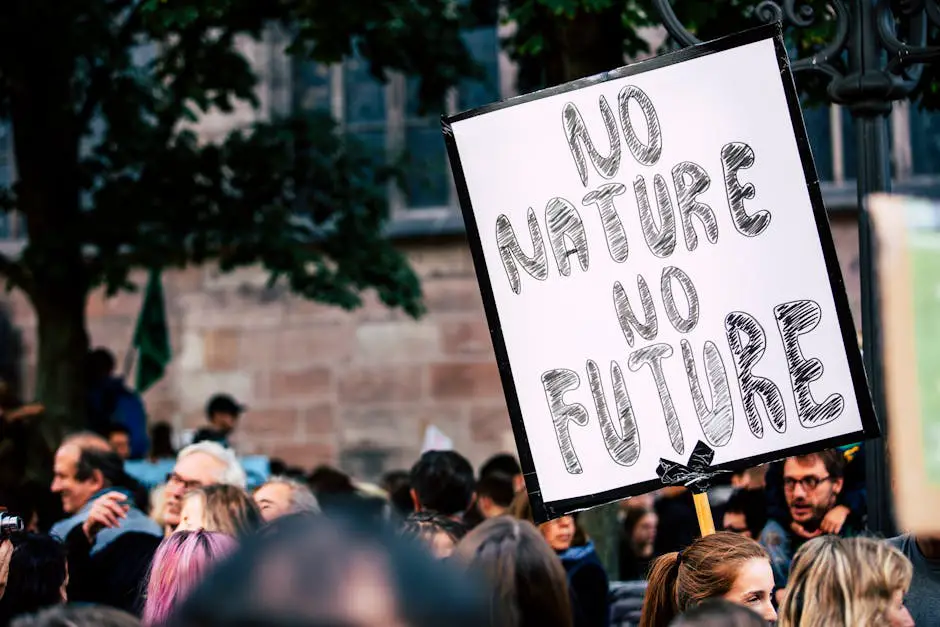Inhaltsverzeichnis
- 1. Schulstreik für das Klima
- 2. Rede beim UN-Klimagipfel
- 3. Einfluss auf politische Entscheidungen
- 4. Right Livelihood Award
- 5. Globale Klimaproteste
- 6. Einfluss auf die Medien
- 7. Inspiration für junge Aktivisten
- 8. Auszeichnung als 'Person des Jahres'
- 9. Treffen mit globalen Führern
- 10. Wandel in Gesellschaft und Politik
1. Schulstreik für das Klima
Greta Thunberg initiated the now globally recognized "Schulstreik für das Klima" at the age of 15, igniting discussions on climate policies and responsibility. This led to worldwide support and further activism within younger generations.
Her straightforward approach leveraged youth voice as a powerful catalyst for global environmental activism, resonating across various cultural and demographic divides.
2. Rede beim UN-Klimagipfel
Greta Thunberg's plea before world leaders at the 2019 UN Climate Summit in New York epitomized her role as an advocate for environmental policy change. The rallying cry of "How dare you" from her speech exemplified the growing frustration and urgency felt by many young activists about global inaction on climate crises.
Greta's speech attracted global media attention and served as a reminder of the need for immediate action against the threat of climate change. This event increased public awareness and dialogue around climate issues, illustrating the impact that a well-spoken exposition can have in drawing attention and rallying support from diverse quarters.
Her ability to hold the attention of global leaders and citizens alike reflects the blend of youth fervor and clarity she brings to the climate movement.

3. Einfluss auf politische Entscheidungen
Greta Thunberg's stand on environmental issues has shaped policy discussions and actions worldwide. Her engagement has pressed political realms, where urgency towards climate measures has heightened.
In various countries, Thunberg's advocacy is influencing agendas and forming actionable insights that address climate challenges. Elections and political debates often reference her points, underscoring the shifts she has sparked in environmental policy discussions.
Countries are increasingly considering green policies, indicating a willingness to alter practices that harm the environment. From proposing regulations on carbon emissions to reevaluating energy strategies, the footprints of her activism are evident. These shifts signify a move toward more sustainable environmental stewardship.
Additionally, Thunberg's interactions with political figures and open letters to governments and corporations amplify her role as an influencer in global climate politics. Her stance has formed a bridge that many activists now cross, galvanizing collective voices to foster a global advocacy network aimed at spearheading political and social changes.
Her pursuit demonstrates that real change is driven by persistence and belief in actionable reformation, supporting the assertion that action is necessary to safeguard our planet.
4. Right Livelihood Award
Greta Thunberg's receipt of the 2019 Right Livelihood Award, often dubbed the 'Alternative Nobel Prize,' is a testament to the global resonance of her climate advocacy. As she stood recognized on this prestigious platform, it further legitimized the discourse around the urgency of global climate action. This accolade was specifically for her mobilization of youth in demanding sustainable environmental policies and for challenging world leaders to prevent climate disaster.
Receiving the Right Livelihood Award underscores the acknowledgement and support of Thunberg's strategies, which remind us of the balance needed between development and environmental conservatism. Greta has broadened this dialogue among decision makers, academics, and the larger public worldwide. This international distinction pinpoints the value of outspoken advocacy mixed with informed policy dialogues.
Honoring her with this award illuminates the convergence between traditional political avenues and unconventional platforms in rallying for climate action. It embodies a shared conviction across global civil societies about the urgent need for climate justice.
The Right Livelihood Award has fortified her standing as a mobilizer and a beacon for younger generations, redefining grassroots activism and echoing the urgency to valorize ecologically-sound practices against the threat of climate change. Her journey triggers vital conversations and allocations towards healthier ecosystems, modeling that change is achievable when persistence meets conviction.

5. Globale Klimaproteste
The escalation of global climate protests is a milestone in Greta Thunberg's activist repertoire. Originating from her solo protest, the 'Fridays for Future' movement took a leap under her leadership, igniting a ripple effect across continents. The campaign drew millions into the streets, driving a unified message that resonated across global communities.
In cities worldwide, citizens of all ages banded together, showcasing global solidarity. The pressure from these protests prompted numerous cities to declare 'climate emergencies,' an acknowledgement of the climate crisis that stressed the need for immediate governmental actions.
Tangential has been the incorporation of climate education in academia spurred by the activism of 'Fridays for Future'. Schools worldwide are increasingly merging climate science into their curricula, empowering students with knowledge about sustainability and their roles as stewards of the planet. This educational shift signifies an enduring imprint of the movement.
The conscientization process catalyzed by these demonstrations has also promoted a culture of environmental responsibility in businesses and industries, driven by consumer demand favoring eco-friendly practices. This shift underscores the economic influence wielded by collective protests.
Equally impressive is the diplomatic shift observed in political arenas. Led by youth voices, the cries for change have ruptured traditional partisan debates on environmental policies. Lawmakers find themselves recalibrating policies to frame climate action as an electoral compulsion driven by the informed voter lobby.
From a solitary figure to hundreds of associated protest themes worldwide, Greta Thunberg and her supporters emerge as harbingers calling for systemic transformation. This dialogue amplifies a concerted chorus, demonstrating that change is profound when the cause resonates unanimously. These global climate protests instill hope and exemplify that activism rooted in solidarity can redraw world perspectives on sustainability and survival on our shared planet.

6. Einfluss auf die Medien
Greta Thunberg's influence on the media landscape is an essential dimension of her climate advocacy. She has established climate change as a staple in media discussions and invigorated a shift in how environmental issues are portrayed and prioritized by the media around the world.
Greta's direct method effectively uses each speaking opportunity to emphasize the immediacy of climate action. This strategy has altered the narrative frameworks within which climate news coverage is crafted. From her speeches to tweets, Greta engages with the media, elucidating the necessity for environmental stewardship and calling out inaction. Her assertive approach has cultivated a more persistent media focus on accountability issues pertaining to climate policies.
The "Greta Effect" encouraged a flurry of investigative journalism that scrutinizes whether nations and corporations are meeting their environmental promises or engaging in greenwashing1. This journalistic vigor digs deeper, challenges harder, and illustrates the depth of environmental crises more vividly, engaging a broader audience.
Another change is the decentralization of climate discourse represented in the media. Initially dominated by experts and politicians, the conversation now features a broader spectrum of voices including young activists, indigenous leaders, and affected communities, bringing diverse perspectives to the fore. Media strategies have been adjusted; there's a shift from just reporting incidents to narrating these events within broader climate change implications.
Under Thunberg's influence, climate reportage has also become an ongoing narrative rather than periodic coverage dominant only during international summits or natural disasters2. This continuous interest keeps climate issues in people's consciousness, fostering sustained public engagement.
Thunberg's interactions with the media serve as transformative undercurrents remolding global media culture. This ensures that climate change is understood as an encompassing reality, critical to current and future societal dialogues. As she energizes other corners of activism and policy-making, Greta Thunberg ensures the press remains a potent ally in the call for urgent climate action. The narrative she has helped shape in the media acts as a reminder of the roles each societal segment needs to play in securing a viable planet for future generations.
7. Inspiration für junge Aktivisten
Greta Thunberg's story is not merely one of protest but also a compelling saga of inspiration. Across the globe, a bold wave of youth activism is surging, fueled by her steadfast commitment to environmental justice and her fearless stance against global inaction. From classrooms to the frontline of protests, children and teenagers are channeling what some might call the 'Greta Effect'. They are organizing climate marches, engaging in thoughtful debates, and demanding stringent environmental policies in their locales.
Greta's influence extends beyond mere encouragement; she has crafted a blueprint of activism that combines passion with practicality—making it strikingly clear that age is irrelevant when the stakes are as high as the survival of our planet. That message ripples through every street protest and policy lobbying, carried forward by young voices unwilling to be stunted by political inertia. They orchestrate school strikes, leveraging their collective presence as a force potent enough to infiltrate public consciousness and unsettle legislative comfort zones.
The emotional breadth of Greta's advocacy resonates deeply within young hearts. Her authentic expressions of fear, anger, and hope articulate the climatic anxiety many young people feel but also channel these emotions into a powerful narrative engine driving the climate dialogue forward.
Through Thunberg, millennials and Gen Z see the reflection of their own anxieties and aspirations. They recognize in her the embodiment of their potential impact. She stands as proof that their voices matter, their actions can disrupt, and their demands must not be ignored. Her example has bred awareness and an undying spirit of activism that promises to hover over the echelons of power until substantial changes are made.
8. Auszeichnung als 'Person des Jahres'
In 2019, a towering recognition came in the form of Time magazine naming Greta Thunberg the 'Person of the Year,' a prestigious accolade highly publicized and deliberated worldwide. Bestowed primarily for her relentless stimulation of global climate activism and her astonishing ability to sway public opinion and governmental policy, this distinction echoes the seismic impact of her advocacy.
What makes this acknowledgment incredibly striking is not merely the personal recognition of Greta but the profound manner in which it underscores the urgent relevance of grassroot climate action within global discourse. Time's portrayal of Greta as a pivotal figure in the climate crusade mirrors her large scale influence amidst perilous times of unyielding environmental degradation—prompting a surge in dialogues about realistic, actionable environmental reforms.
This accolade also crossed usual demarcations of political, cultural, and age divisions, casting deeper visibility on climate issues to a diverse spectrum of individuals who perhaps previously engaged with such topics with lesser fervor. In an era marked by information overflow and fleeting attention spans, the permeation of a solitary figure emblematic of a broader cause into myriad forums denotes a captivating lesson in communication strategies for activism: quintessentially, it's not always about presenting voluminous data but rather about embodiment by relatable narratives able to instill empathy and impetus.
As mesmerizing as such accolades are in the public eye, they fundamentally echo a broader parley about the power dynamics within media framing and recognition—connoting both a validation of cause célèbre yet equally a tool moderating the world's screen into essential discussions. Such recognitions intertwine personal successes within the intricate lattice of societal victories—wherein every commendation threads forward the narrative of resilience against adversity in a warming world.

9. Treffen mit globalen Führern
One of Greta Thunberg's most visible roles on the global stage has been her interactions with international leaders, an endeavor that has defined significant chapters of her advocacy. Her continuing dialogues with key global figures such as Germany's Chancellor Angela Merkel and UN Secretary-General António Guterres underscore her pivotal influence on shaping international climate policies.
As a young activist, Greta's encounters are far from mere ceremonial exchanges. Instead, they reflect her recognized status as a fundamental actor in the global policy arena. These discussions often aim at instigating substantial political commitment toward accelerating climate action in line with the urgency of the environmental challenges facing our planet.
During a meeting with Chancellor Merkel, Greta Thunberg exemplified her typical poised yet assertive demeanor, pressuring the Chancellor to consider more aggressive climate actions in Germany's national policies, echoing the message she consistently delivers: the necessity for immediate and bold climate initiatives.
These encounters aren't just simple meet-and-greets but are potent enough to spark international news headlines and sometimes lead to palpable shifts in discourse at higher levels of governance. It's this pivotal engagement that further exhibits her unimaginable reach and indefatigable zeal to instigate real-time global change, continuously advocating not just in public protests or through viral tweets, but right where policies are formulated and global agendas set.
Continuing to break barriers, Greta leaves an emphatic imprint on the global political landscape. Each meeting delineates the broad spectrum of her efforts and their resonant echoes through corridors of power worldwide—asserting that the flames of activism she ignited expand in breadth and deepen their traces in the canvases of global governance and policy reforms.

10. Wandel in Gesellschaft und Politik
Continuing the exploration of Greta Thunberg's significant contributions, it is important to underscore the broad societal and political transformations her activism has ignited. Beyond the powerful scene-setting of protests and poignant speeches, Greta's campaign has encouraged both tangible policy shifts and a heightened public engagement around environmental issues, clear indications of a gradually shifting paradigm in societal and political demeanor towards our planet's health.
Greta Thunberg's environmental crusade catalyzes a shift in public consciousness, advancing climate change from a sideline in public discourses to a central subject of global concern, vigorously discussed in households, educational institutions, and legislative halls alike. Her voice has proven catalytic, turning passive awareness into active participation, encouraging individuals from all walks of life to take greener stances in their daily choices—be it using less plastic, optimizing water usage, or supporting sustainability-driven brands. In essence, Greta has spearheaded a green cultural shift, normalizing eco-conscious living and pushing back against eco-anxiety with informed action and empowerment.
Politically, her influence fosters a perceptible change. Her stirrings have prodded governments worldwide into declarations of climate emergencies—an acknowledgment of the escalating ecological crisis and the necessary governmental urgency required to face it.1 These declarations pioneer precedents for integrating more robust, forward-thinking environmental policies within national and international governance frameworks. By persistently placing her demands on governmental agendas, Greta elevates the profile of climate priorities high enough that overlooking them becomes a political hazard.
Campaigns and discourses inspired by Greta's activism are reshaping electoral politics. Politicians are increasingly mandated to position their environmental policies upfront, as voters—especially the younger, more environmentally conscious demographics—base their electoral decisions on candidates' eco-crusading credentials.2 Thus, climate politics is not merely a specialty area within the broader political spectrum but seizes the position of a timely keystone criterion influencing broad spectrum policies.
Environment-conscious public welfare initiatives such as expanded green zones in cities, boosted support for public transit systems, greater incentivization for renewable energy use, and international cooperation on climate goals underscore a shift from ecological disregard to a pronounced accountability minimizing human impacts on nature. In various forums, thanks to activist pressures, we now see an entrenchment of sustainability perspectives within the strands of developing economic theories, urban planning, and even in the finer threads of trade agreements.
An essential beacon illuminating these shifts is the focus on youth-led climate dialogue, inspired substantially by Thunberg's paradigm of plugged-in activism. The future policy-making trend seems inevitably inclined to incorporate broader ecological implications with greater transparency and stronger adherence to scientific recommendations—a discourse reshaped by the eco-enthused youth sounding persistent alarm bells.
Amidst various influences and accolades, the essence of Greta Thunberg's impact lies in her ability to transform public discourse on climate change. Her persistent advocacy has reshaped how societies perceive and engage with environmental issues, proving that sustained activism can indeed lead to substantial policy shifts and heightened global awareness.





0 Kommentare